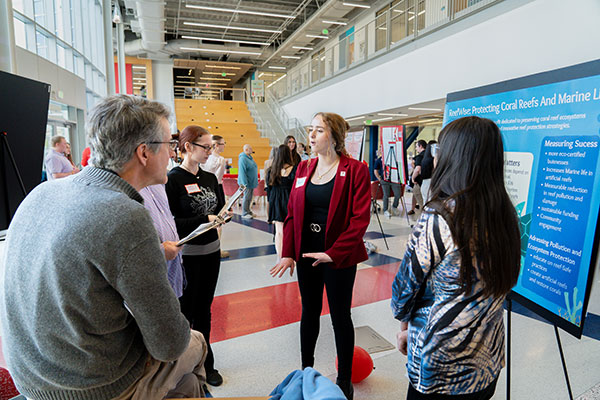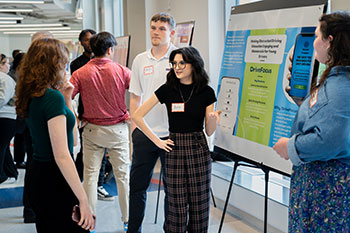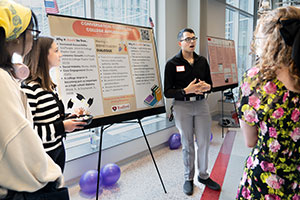
When you think of the world’s most complex problems, there is a good chance at least one Radford University student has spent countless hours working to find a solution.
Walking into the lobby of the Artis Center for Adaptive Innovation and Creativity on Tuesday evening, April 15, you could see the results of the hard work and research efforts many students have conducted toward those solutions over the spring semester. The students, most of whom have worked in groups in various courses, were in the Artis Center as part of the Wicked Festival, an exposition of student problem-solving.
Wicked, if you’re wondering, refers to society’s most difficult-to-solve problems.
The festival is hosted by the university’s College of Humanities and Behavioral Sciences (CHBS) and is supported by the Center for Innovative Teaching and Learning, Citizen Leader and the Office of Undergraduate Research.
The Wicked Festival happens twice a year – once near the end of the spring and fall semesters – and it gives students an opportunity to speak about their research with visitors, fellow students, faculty and university administrators. Each presenter displays a colorful poster that illustrates a wicked problem they have identified, reveals sources and offers a potential solution.
“The Wicked Festival isn't just a night; It's a movement,” said Department of Political Science Professor Paige Tan, a chief organizer of the event.
“Faculty are centering the process of learning, how to solve problems and guiding students to find solutions to the public problems they care about,” she said. “From creating new curricular offerings like the Wicked Problems class and minor to co-curricular events and organizations like the Wicked Society and Wicked Festival, we're creating a movement of faculty and students who care about solving the tough public problems of our time.”
The message faculty are sending their students, Tan explained, is “there are a lot of tough problems out there, but we are not powerless before them.”
The wicked process begins at the beginning of each semester when students pick a topic and work in groups for several weeks to conduct research, which could be anything from finding sources in publications to talking with community leaders. They then write papers, give in-class presentations and design a poster to concisely present their work at the festival.

This spring, 360 students participated in the festival. Eleven Radford faculty members from 15 courses or programs assigned wicked problems to their students. Five Radford University colleges participated: the Artis College of Science and Technology, CHBS, Davis College of Business and Economics, Honors College and the College of Visual and Performing Arts.
Radford faculty lists a number of reasons for assigning the Wicked Festival. Davis College economics instructor Jennifer Elias said wicked “pushes students to grapple with complexity.
“I want them to think not just about what should happen in theory but what’s possible in practice,” Elias continued. “That means asking tough, practical questions like: Where is that funding coming from? Would the government really pass that law? Why isn’t this happening already? Wouldn’t that harm other stakeholders? Are people unaware – or do they just not care?”
Wicked gives students “an opportunity to step into a different conversation,” said Christopher Wilson, a junior criminal justice major from Arlington, Virginia. He partnered with fellow juniors Kousso Bennett and DeShayla Williams to participate in the festival as an assignment in their Marketing 101 course.
The trio explored opportunities to decrease food waste through the creation of a food delivery app.
Wicked “also gives you an opportunity to dwell on something that you have some type of passion about or you're interested in. And you get to network, you get to meet people and get to dress up,” said the dapper Wilson, wearing a black suit and white button-up shirt. “It gives you something to look forward to and be able to interact with people and feel involved. Wicked Festival gives you opportunities.”
Wilson relished the opportunity to work with Assistant Professor of Marketing Luke Liska while researching the team’s topic.
“At larger schools, you may not be able to have a working relationship with your professor when it comes to doing research,” Wilson said. “But I feel like Radford gives you that opportunity to actually work with faculty and get their perspective and insight and also give them your input.”
A few feet away from Wilson was sophomore Jacob Crewell, who echoed those same thoughts as he talked with visitors about issues concerning affordable housing in the New River Valley. The accounting major from Richmond, Virginia, was assigned to present at the Wicked Festival in a political science course, The Art and Science of Leadership, he was enrolled in with Professor of Political Science Chapman Rackaway.
“It’s an unbelievable, amazing opportunity to get to work so close with Dr. Rackaway,” Crewell said. “It was very beneficial. He guided us in a direction that we wanted to go.”
Crewell worked on the project with classmates Eduardo Blanchard and Tee Reed. Both had other commitments the night of the festival, Crewell said, so he presented the project solo.
The Wicked Festival provides a perfect opportunity for students to practice essential communication and problem-solving skills in a public setting, said Department of English faculty member Jessica Mattox. It’s one reason she assigned the festival to students enrolled in her Professional Writing II course.

“Understanding the basic facts about their wicked problems is not enough; students must also understand the rhetorical situation of their wicked problem if they hope to enact measurable change,” Mattox explained. “By identifying the stakeholders involved, the genres and methods of communication those stakeholders use and the interests of each stakeholder, students will be better equipped to take real action and foster solutions to their wicked problems.”
Faculty participating in Wicked are “creating a Radford student who is skilled in problem-solving, communication and persuasion,” Tan said. “Wicked students will have the values and dispositions of a problem solver; they will hope for a better world and care for others. They will be confident, empowered and savvy.”
After two hours of presentations, festival participants and attendees were treated to a brief talk from guest Nina Schwalbe, a global health expert and leader in vaccines and immunization who has worked at the United Nations and USAID. Currently, she is working to secure approval for the Global Pandemic Accord in Geneva, Switzerland.
As Schwalbe spoke, festival judges returned down the Artis Center stairway with the results of their deliberations. Throughout the evening, four groups of three judges visited those nominated for awards as they presented, asking questions and making notes on clipboards.
Awards were given at the end of the festival for outstanding presentation, distinguished research and impactful solution. A rising star award was also given. For the first time, $100 cash prizes were given to Wicked Festival gold award winners. The money resulted from fundraising by the Wicked Society student group and Department of Political Science Professor Tay Keong Tan.
Below is a list of spring 2025 Wicked Festival awards winners with the names of the projects. Their supervising faculty members and courses are listed in parentheses.
Outstanding Presentation:
- Gold: Taking down a Dictator: Venezuela. Riley Johnson (POSC 490, Paige Tan)
- Silver: The Threat of AI to Literary and Artistic Professions. Ryan Young, Fletcher Mutert (INST 490, Tay Keong Tan)
- Bronze: How might we improve the parking experience at Radford University to reduce congestion, increase convenience and ensure fair access for all students, faculty and visitors? Dylan Dampeer, Ethan Sherman, Cate Carlson, Sam Capps (MKTG 101, Luke Liska)
Distinguished Research:
- Gold: Economic Empires: How the United States Can Handle Chinese Technological Advancements in the Race for Economic Dominance. Jalyn Waller, Jonas Miller (POSC 350, Paige Tan)
- Silver: Reforming a Dictatorship: Singapore’s One-Party State. Rose Guillaume (POSC 490, Paige Tan)
- Bronze: AI Companions and their Impact on Teens and Minors. Sophie Crawford, Sarah
Showalter (POSC 410, Tay Keong Tan)
Impactful Solution:
- Gold: How to Feed AI: An Energy Crisis for the Future. Benjamin Goldfeder (ECON 340, Jennifer Elias)
- Silver: Proposal for a Sustainable Food Culture on Campus. Kendall Kennedy, Brenna Cooper, Abigail Dillon, Isaiah Kigwe, Ellie Mathenia, Lily McConkey, Kylie Minter, Kathryn Saunders, Mikayla St. Sing, Olivia Stroud (HONORS 310, Laird Christensen)
- Bronze: Child Trafficking. Kennedy Cole, Jenna Slepetz (POSC 410, Tay Keong Tan)
Rising Star
- Gold: Filling the Plate: Eco or Ego: Understanding the Impact of Greenwashing. Alexandra Barragan (PHIL 115, Katy Shepard)
- Silver: ClearMind: Ending Hazing Together. Tomas Rivera, Liliana Cordero and Sarah Seagraves (POSC 180, Chapman Rackaway)
- Bronze: How might we reduce coral reef pollution? Abigail Harrington, Sierra Spencer, Mackenzie Richardson (MKTG 101, Luke Liska)